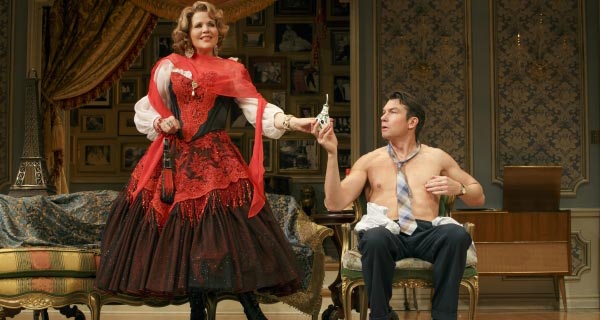Living On Love
Longacre Theatre
11 April 2015
1 Star
There is nothing sadder than seeing a genuine superstar being diminished by participation in a lousy Broadway vehicle. It has happened many times before and no doubt will happen many times in the future. Right now, at the Longacre Theatre, where Joe DiPietro’s crassly dull play Living on Love is in previews, it is Renée Fleming’s turn.
Fleming is an accomplished operatic soprano with a voice of ravishing beauty and the capacity to move opera audiences to extremes of emotion by her extraordinary singing and her skill as a musical performer. Indeed, some of the finest moments in this play occur when Fleming sings the odd phrase or legato line. “Was that a bird?” She asks, then trills sublimely: “Oh no, it was only me”. It is no understatement to describe that as one of the wittiest, funniest moments in the play.
The plot is dreary. Fading Diva is married unhappily to fading Maestro. They are Italian, at least in overall effect if not truth. He is writing his memoirs and wants only to talk of his bedroom triumphs. His impecunious, geeky ‘Spooky Helper’ (that’s ‘funny’ for Ghost Writer…yes, that gives you an insight into the standard of writing here) has no self-confidence but wants to write the great American novel. Maestro fires Spooky Helper which brings the Publisher’s rep to his door to seek a refund of the advance on the memoirs.
She (you see where this is going, right?) is pretty and wants to prove herself in a male world of publishing. It’s the Fifties and Bernstein, the Maestro’s predictable rival, is about to slum it on Broadway with West Side Story. Call her Pretty Hopeful Editor. Maestro likes the look of her and hires her to write his memoirs. Annoyed, Diva rehires Spooky Helper to write her memoirs and secures an advance which is a dollar higher than Maestro’s. The race to finish the memoirs is on.
What follows involves three sets of lovers (there is a duo of servants also in the mix) revealing their true feelings, some gorgeous frocks for Fleming, silly jealousy, the odd bit of singing and a dog, called Puccini (Poochini seems a missed opportunity) and some awkward, mawkish sentimental drivel about current social themes.
And very few laughs.
Derek McLane’s set is quite beautiful and successfully evokes the sense of Europe in a ritzy Manhattan apartment. Anyone who has been to the Sacher Hotel in Vienna, the favourite city of the Maestro and the Diva and the place where they first met, will immediately understand the mileu McLane has adopted here. Superb taste is everywhere, in the ornate ceiling work, the sumptuous fabrics, the grand piano, the just so furniture. There is a wall of framed photographs of past operatic and musical triumphs – the sense of a rich, expensive life in the Opera world is tangible.
There is also a prodigious collection of snow globes. As soon as you see them, you know some of them will be smashed, it’s just a question of how and when. Equally, you know that, no matter how much they might go all Benedick and Beatrice or Katherine and Petruchio, the Maestro and the Diva will kiss and make up. And you know that Spooky Helper and Pretty Hopeful Editor will get together in a frenzy of tousled clothing. Also, if you don’t know that the servants are secretly a couple, you are officially brain dead.
You might not expect Puccini to appear in full Diva garb at one point, but otherwise this play is as predictable as death and taxes. And similarly rewarding.
Kathleen Marshall is a woman who understands the inherent musicality of comedy but not even her considerable talents can make a dent on this plodding nonsense. If it has a musical sense, it is that of a dirge.
Some of the performances do not help. Jerry O’Connell is entirely miscast as the Spooky Helper; this is an archetypal farce character – a nerdy guy, with spectacles and an asthma puffer, the kind you don’t expect to look ripped when his shirt is removed. O’Connell is just too good looking and is not nervy or unusual enough to make the eventual, obvious pay-off work.
Anna Chlumsky, as Pretty Hopeful Editor, is too modern and does not convince as the mousy office girl who wants to prove her work colleagues and mother wrong about the role of women in the workforce. She has excellent moments – for instance, her rebuking of the Maestro in Italian – but the performance is neither quirky nor perky enough.
As said Maestro, Douglas Sills is the embodiment of the Curate’s Egg – good in parts. There are moments when his ludicrously obnoxious musician is genial enough, and occasionally he provokes a real laugh from the audience, but mostly he cannot, no matter how hard he tries, make the trite dialogue zing. He tries, certainly. His array of expensive silk pyjamas is impressive, but there are not enough moments of farcical rage and indignation to set the piece on fire.
Accidentally, the best moment of the production came about because Sills was actually choking on a piece of toast he had to consume as part of a scene with O’Connell. Asked a question, Sills went red-faced and responded, slightly smirking, that he was choking. O’Connell appeared to think it was an attempt at making him corpse, and ignored Sills. But when Sills repeated that he was really choking, a flash of desperation coursed across O’Connell’s face. What to do? He was flummoxed momentarily. Then Sills rallied, having consumed liquid, and put the dialogue back on track by reversing to a point where the choking had not commenced. O’Connell took it in his stride, and, for the first time, the only time, the audience felt conspiratorial about the play.
As the Diva, Renée Fleming certainly looks the part, and she can trill opera tunes with immaculate ease. Hair, dress, posture and poise are all spot on. But the simply undeniable fact is that she is not an actress trained in the art of farce or high comedy (different arts, either of which could be applicable in this piece of writing) and so she comes off second best, even though she is one of the most likeable and charming performers. She is by no means bad, but neither does she excel. But then, truly, how could she with this material?
The script puts her in awkward positions. The dress she is forced to wear, allegedly indicative of her performance as Mimi in La Boheme, seems more suited to Carmen or La Fanciulla del West. What was costume designer Michael Krass thinking? The final scene requires her to sing the Irving Berlin standard, Always, not in her Diva voice, but in that halfway-house position, neither Operatic nor Musical Theatre in style. The fact that the song is essential to one of the all time great comedy/farces, Blithe Spirit, is another reason to ponder on its inclusion and prominence here.
There are smart, taut and very well timed performances by Blake Hammond and Scott Robertson as the butlers to the Diva and the Maestro. Both actors work very well together and achieve a harmony well beyond the writing. They sing a little and play the piano too, giving the play a musical hall/vaudeville feel it does not live up to but which is very welcome.
As Puccini, the pampered pooch, Trixie is a triumph, although, to be frank, some snarling at the Maestro would not have gone amiss.
At one point, the Maestro puts Maple Syrup in his hair to smooth it down and make him appear debonair. Yep, it’s that kind of show…
This is not a text worthy of a Broadway stage. It needs much refinement. And the fault here does not lie in the stars.

